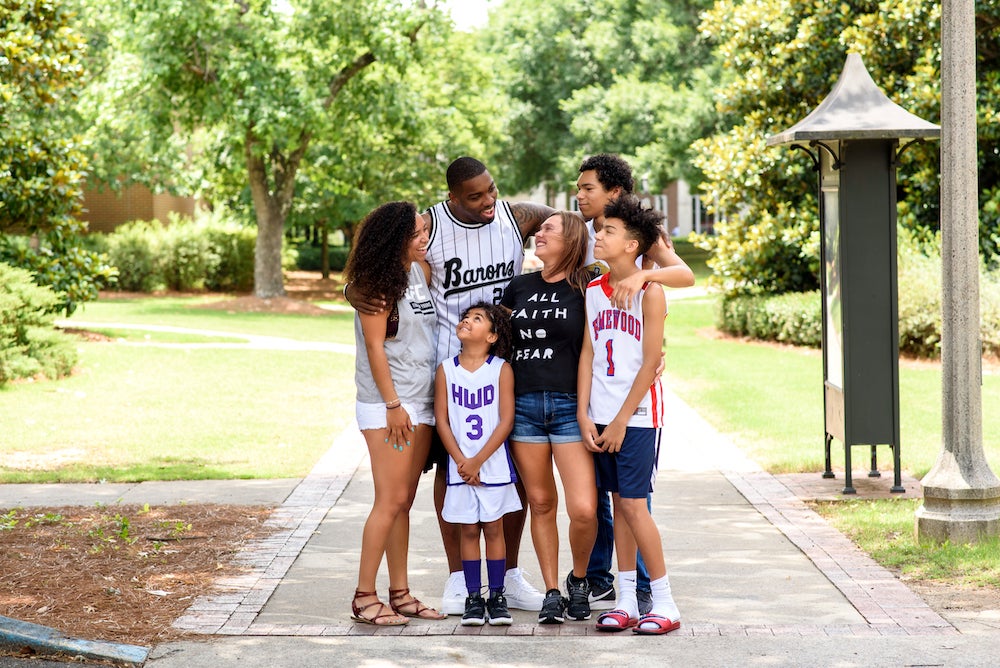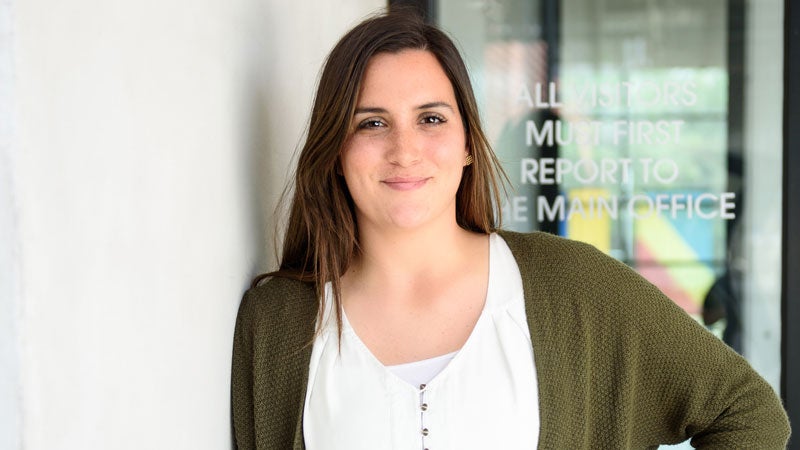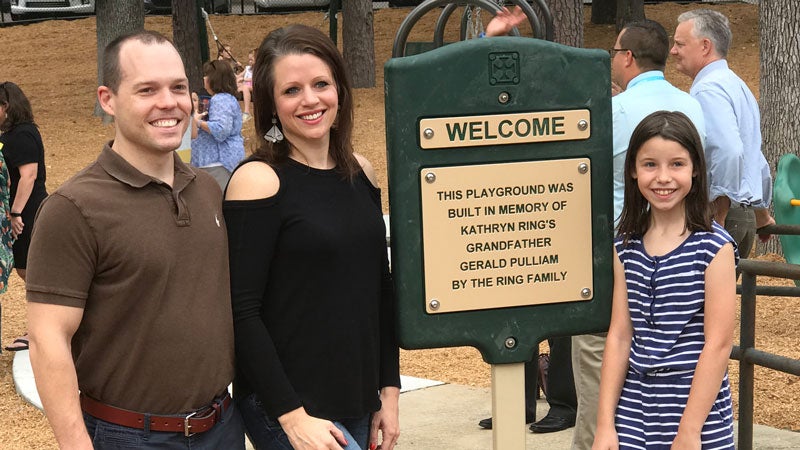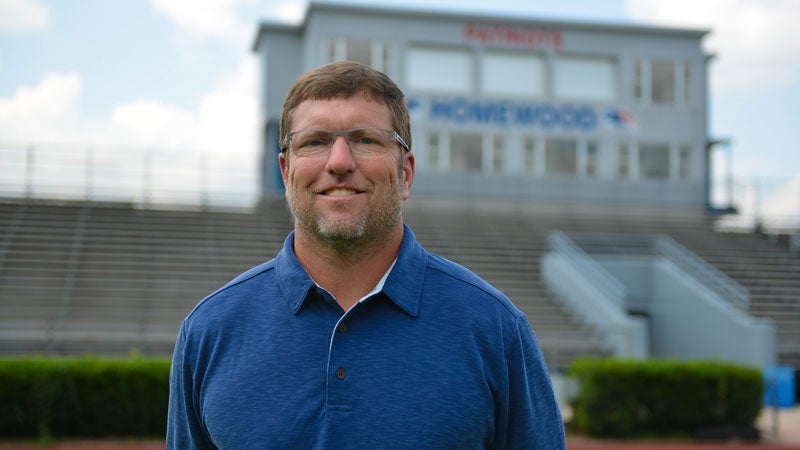By Madoline Markham | Photos by Lindsey Culver Photography & Contributed
Aniah Blanchard had an infectious laugh. She loved to see other people happy and couldn’t wait to become a teacher and softball coach.
Look around Homewood today, and you’ll see her. A plaque with her photo hangs at Homewood High School, where her softball jersey number, 22, has been retired. Over at Patriot Park—where she and her friends hung out growing up—her friends erected a bench bearing her name. Each year Homewood City Schools Foundation gives out a scholarship in memory of the 2018 Homewood High School graduate, and on Dec. 21, Homewood City Hall lights up in baby blue, her favorite color, for Aniah Blanchard Day. In traffic you might spot a baby blue sticker that says “Forever Aniah” or depicts a softball with angel wings.
If you see her mom, Angela Haley-Harris, around town, she’ll have several baby blue bracelets bearing her daughter’s name around her wrist and likely offer to give you one. Though she lost Aniah in 2019 at age 19 in a devastating turn of events, today Angela and her family live for her and carry out her legacy around Alabama and beyond.
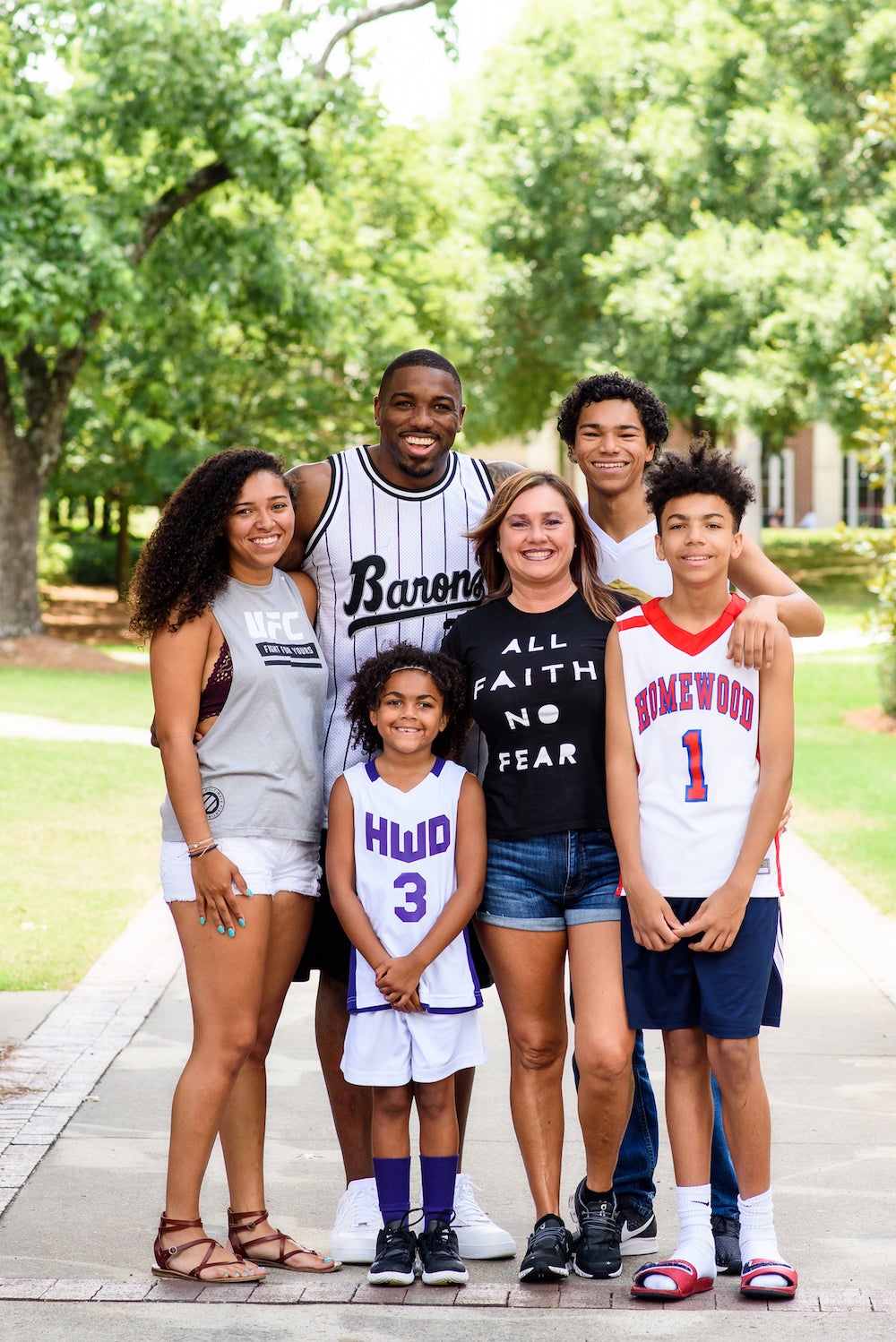
Aniah’s Heart
About a week after learning Aniah had been kidnapped from a convenience store in Auburn in October 2019, Angela heard a voice saying, “Mom, please don’t let this happen to anyone else.” “And I said, ‘Baby I won’t,’” Angela recounts. That voice stayed with her as news came on Nov. 27 that Aniah’s body had been identified. She and her family attended her daughter’s memorial service on Dec. 21.
As soon as she could, Angela had a nonprofit up and running. “It was a no brainer on what to call it because Aniah’s heart was so big,” she says. “I knew I wanted to teach people situational awareness and self defense.” In part she knew that because she knew one of her daughter’s biggest fears was, tragically, the one that was realized: being kidnapped.
Today Aniah’s Heart regularly holds self defense classes taught by Angela’s husband, professional mixed martial arts fighter Walt Harris, and Aniah’s older brother, Elijah. The classes are a family affair, with Angela and Aniah’s younger siblings Asah and Aylah attending and helping out. “We want [those who come to the classes] to know anyone can be a victim and that you have to be aware at all times, and that you have to be confident,” Angela says. “[Then] if you do get yourself into that situation, you know how to protect yourself and you will feel confident to do it.”
Angela is also passionate about sharing Aniah’s story and situational awareness with any groups she can, speaking at schools and to sororities at Auburn and UAB, as well as helping with search and rescue for other missing persons and supporting their families through Aniah’s Heart. The nonprofit has been a part of 15 searches across Alabama so far and has helped locate two people.
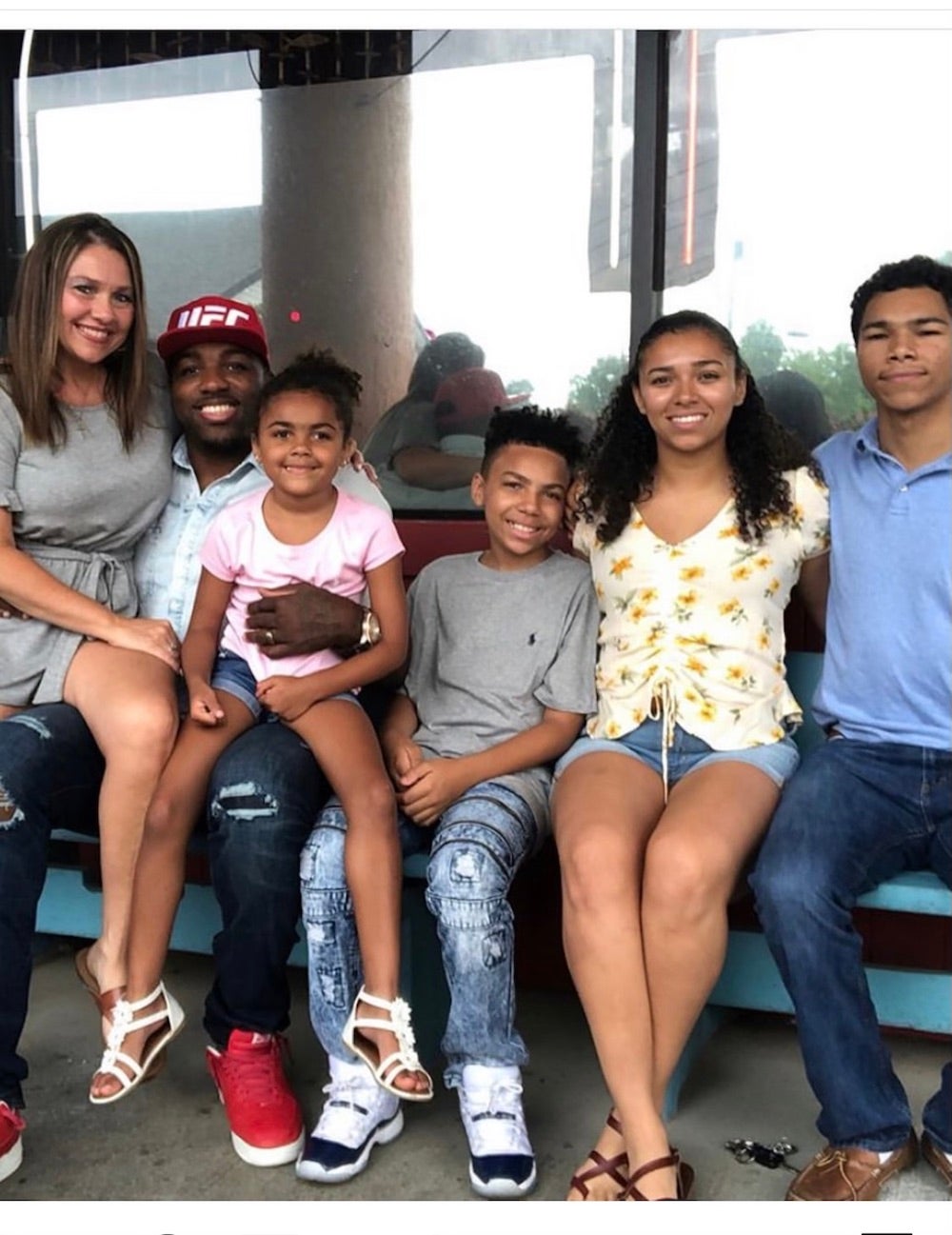
“A lot of people don’t understand why I like to be out searching, but it’s just something I have in me,” says Angela, who worked as a forensic nurse, specializing in sexual assault for 20 years at Children’s of Alabama. “I can do it because I know how important it is for that family to want to know where their loved one is.”
Angela wants those families in crisis to know what they can do after they filing a missing persons report with the police—actions that might not be obvious to anyone unfamiliar with this world that she lived in for the 32 long days Aniah was missing. “I have learned so much about what the police can do and what civilians can do, and that it does take people other than the police in that search effort,” she says.
Today Angela is quick to inform families about ways to use signs and social media (“the fastest way to get it out there like wildfire,” Angela says,) to get the word out, about using dogs for searches, and about what alerts can be used (The AMBER Alert is persons under age 18 who are missing and believed to be in danger, while the lesser known Ashanti Alert is for ages 18-65). “I am overwhelmed with so many missing people that I can’t keep up,” Angela says. “It breaks my heart.”
Sarah O’Brien, Aniah’s friend and roommate from Southern Union State Community College who now works closely with Aniah’s Heart daily, also tells Aniah’s story at any chance she gets. She’s been on 48 Hours and a local radio station. Next up, she is speaking at her high school, telling anyone she can that if Aniah was a normal college girl stopping at a convenience store, it can happen to anyone. “I don’t want anyone to live in fear, but I want everyone to be prepared,” she says.
Sarah has taken an Aniah’s Heart self-defense class herself and knows the importance of tips Aniah’s Heart shares on Facebook lives, such as if you think someone is following you in the car, take five rights, and if they are still behind you, call the police. “I don’t go to a gas station at night, I share my location with everyone and I feel more aware of my surroundings,” she says of how she lives following Aniah’s death.
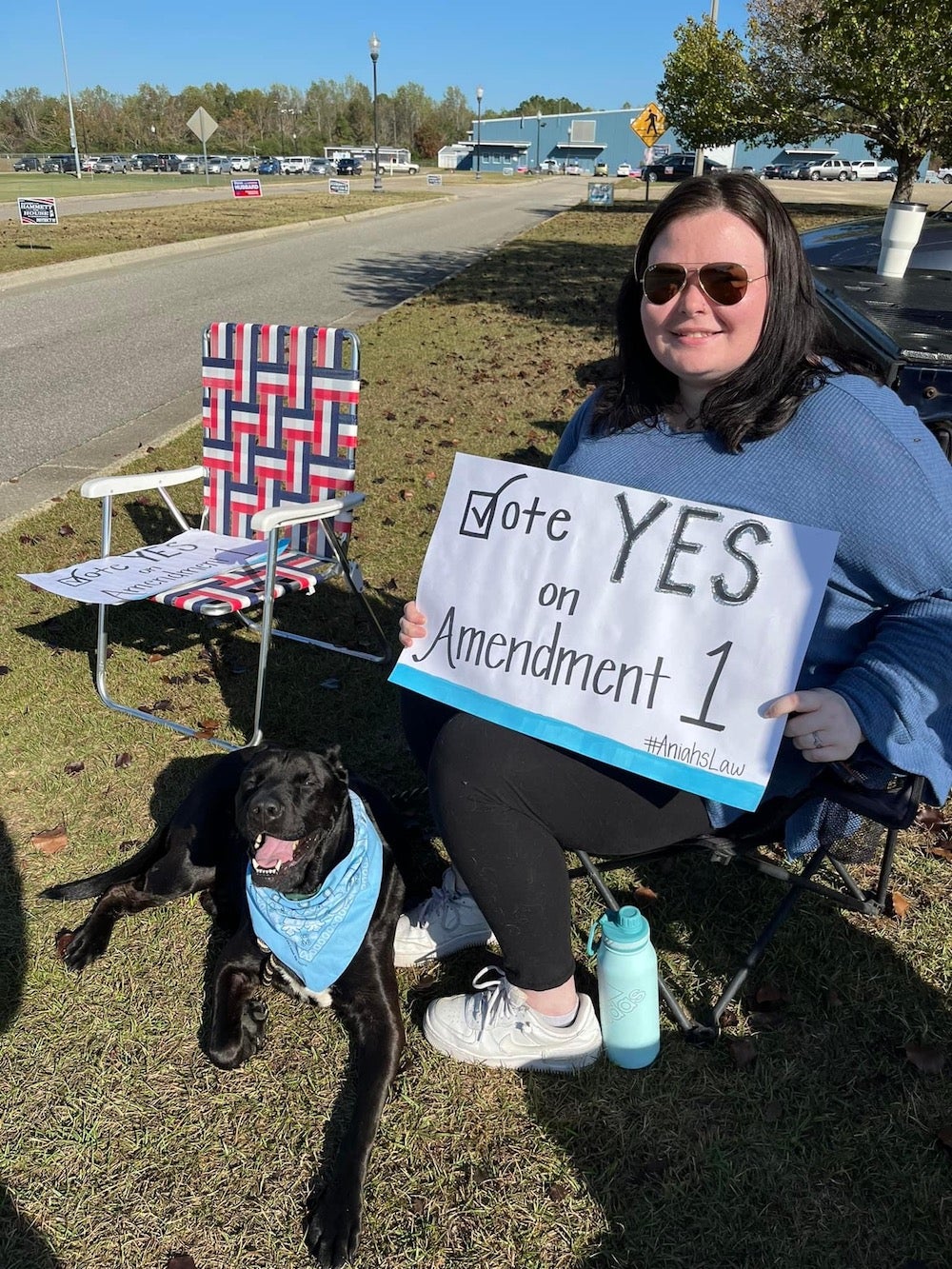
Aniah’s Law
It wasn’t long after a suspect, Ibraheem Yazeed, was announced in Aniah’s kidnapping and murder that Angela found out more about him. “Oh my God, this person who has kidnapped my daughter has this long, violent criminal history and is out on bond for two attempted murders,” she remembers thinking. “This is not okay, and he should not have been out on the street. We have to do something about it.” Yazeed, she later learned, had been released from jail on a $280,000 bond after he was charged with kidnapping, robbery and attempted murder in January 2019 in Montgomery.
Then as Angela was getting ready for Aniah’s memorial service in December, a state representative she grew up with, Tracy Estes from Marion County, called her. “There’s a state representative, Chip Brown out of Mobile, and he has this bond reform bill,” she remembers him saying. “We want to name it after Aniah.”
“And I just broke down because this is was exactly what I wanted to do,” Angela recalls. “It all came together perfectly.”
The bill in its final form added a list of serious crimes other than capital offense that a defendant can be held for without bail before trial. Previously Section 16 of the state constitution had only made an exception to being held without bail for capital murder. A separate bill would spell out that the law would be applied by prosecutors being able to request a pretrial hearing to ask the judge to hold a defendant without bail, with the accused being able to be represented by a lawyer who can testify, call witnesses and cross examine witnesses. From there, the judge can choose whether to grant or deny bail.
Two months later after Angela first heard about what would become Aniah’s Law, the state legislature began its 2020 session, and she and her husband along with Aniah’s biological father and his wife went down to Montgomery to speak to the judiciary committee, telling them Aniah’s story and about how adamant they were that this bill pass. From there, it passed in the state Senate, and then COVID brought the process to a halt until April 2021.
Angela watched the House vote live online from home that day it happened. “When I saw it light up—ding, ding, ding, ding—and it was all green, all the state representatives voted for it, I just fell on the ground because this was absolutely amazing, but my daughter [was still] dead,” Angela recounts with emotion. “That was hard, but I was so happy that lives were going to be saved, and that this was absolutely what Aniah would have wanted.”
Governor Kay Ivey signed the bill in June 2021, and in November 2022, it finally made it on the ballot for the entire state to vote on as Amendment 1.
On election day, Sarah O’Brien sat outside the polls in her hometown, Andalusia, holding signs and urging voters to vote for Amendment 1 with her dog, Zander, who had lived with Aniah and her dog, Bloo, in the fall of 2019. That night Sarah was sunburned, but she got far greater news of the day’s effects: The bill had passed into law.
“I’m overwhelmed with the support we received and so grateful it passed,” Sarah says. “[Aniah would’ve wanted] to save other people from that happening.”

Hannah Crocker, a friend of Aniah’s since sixth grade at Homewood Middle School, redirected her career path from nursing to serving as a police officer in Tuscaloosa after helping search for Aniah every day after she went missing in 2019. She now has a front-row seat, seeing the effect of the law named after her friend.
“Watching people you see arrested come out on bail is so hard,” she says. “Watching our judges feel like they have the power to use that is amazing, and I love watching them use that in Tuscaloosa. It makes me proud and happy knowing you won’t run into them until after their trial.”
A Google news search as of this article’s writing in early March pulls up multiple pages of Alabama news stories of instances where the law has been applied, and this is just the beginning of its life.
Hannah sees Aniah’s legacy live on outside her policing work, too. When her daughter was born in September 2022, she named her Aniah Caroline. “She reminds me every day of Aniah,” she says. “She is bubbly, and she is always laughing.”
Follow @aniahsheart on Facebook and Instagram to learn more about upcoming self defense classes and other efforts in Aniah’s memory.

